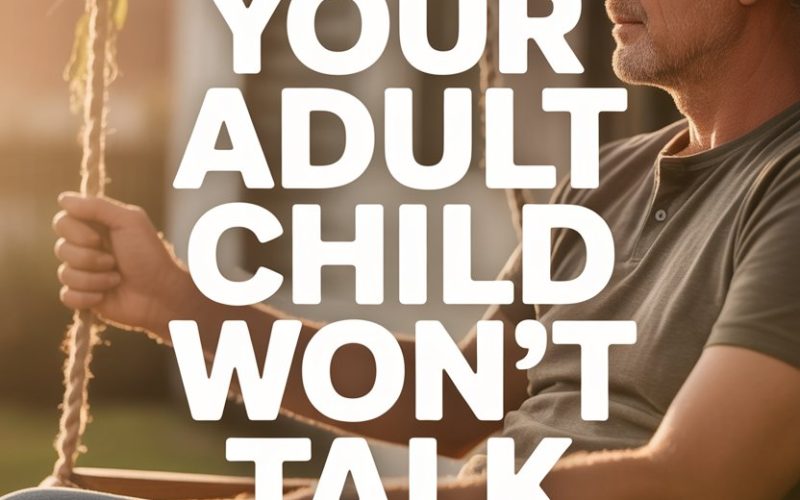It’s the family equivalent of tumbleweeds rolling through the group chat: your adult child just… stops calling. Or texting. Or sending those blurry dog photos you secretly miss.
The silence is so loud you can hear it over your morning cuppa. If you’re wondering what on earth happened—well, you’re not alone.
Let’s dig into why the communication lines might have snapped and, more importantly, what you can do to coax your grown-up offspring out of radio silence.
The Myth of “Once a Parent, Always a Confidant”
There’s a popular fantasy that once kids outgrow nappies, you both naturally settle into some beautiful, coffee-toasting friendship.
Sometimes that does happen. Sometimes, though, your grown child pulls away, and you’re left wondering if you missed a memo.
Turns out, the leap from parenting a child to relating to an adult is more like a pole vault—tricky, daunting, and likely to bruise your ego if you’re not careful.
Many parents unintentionally forget to update the relationship operating software for this new phase.
They Need Space to Be Themselves
Independence isn’t just for toddlers refusing their broccoli. Your adult child is probably carving out who they are, how they see the world, and, quite possibly, how they want to interact with you.
It’s a natural part of becoming an adult to set boundaries—sometimes those boundaries are spelled out, sometimes they’re signaled in Morse code (by which I mean, “I only text you when it’s your birthday, Mum”).
Give them breathing room, even if it stretches your patience. You might be surprised by how much more they say when they feel they’re not being crowded.
Old Hurts Can Linger Like Last Week’s Smelly Lunchbox
No one gets through childhood unscathed. Maybe you argued about school, or clashed over friends, or handled something in a way you now regret.
These moments can linger, quietly influencing how freely your adult kid wants to chat.
And yes, while you might feel “But I did my best!” (you did), your adult child’s feelings are real to them.
Sometimes all they remember is the sting, not what you were trying to do.
Repair is possible, even years later, but it usually starts with you being open to a difficult conversation—and maybe even an apology.
Communication Styles Change
The way your child used to babble at you about dinosaur facts (for HOURS) may have morphed into one-word answers or, if you’re lucky, a meme.
That doesn’t necessarily mean deep hostility.
Some people just get quieter as adults. Others communicate in new ways you might not find satisfying. (A “like” on your Facebook post is not the same as a proper phone call, but for some, it’s effort.)
If you’re always pushing for the long phone chat, you might be missing the ways they are reaching out.
Parental Criticism Still Hurts—Maybe More Than Ever
You probably know this already, but it bears repeating: nobody outgrows wanting approval from their parents. Even as a grown-up.
Comments about their job, their house, their partner, their hair, their children, their choice of oat milk—these can sting, even if you thought you were being helpful.
If they sense every conversation is an excuse for a performance review, they may choose silence over scrutiny.
The Comparison Trap (Thanks, Social Media)
Social media is a highlight reel, not a documentary.
If you compare your child’s achievements (or perceived lack of them) to others—cousins, friends’ kids, or the Inspirational People of LinkedIn—they feel it. Hard.
Research has shown that parental comparison fuels anxiety and resentment in adult children. Try to avoid sentences that begin with “Well, your cousin Emily just…” unless you enjoy being left on read.
Different Life Values and Worldviews
We love our kids, quirks and all, but sometimes they grow up to see the world very differently.
Politics, religion, lifestyle, career choices—these can become tricky ground, especially if family dinners start to feel like a debate club.
Steering clear of loaded topics might seem like walking on eggshells, but respecting their right to their own views (and keeping unsolicited advice to a minimum) can help keep the lines of communication open.
Unresolved Family Dynamics
Family roles are stubborn. The “baby” of the family might be forty and still get treated like a teenager. Old patterns sneak back in, especially at Christmas or other family gatherings.
If you always play the fixer, or the peacemaker, or the question-asker, your adult child might withdraw simply to avoid old scripts.
A little self-reflection helps. Are you relating to the adult they are now, or the kid they used to be?
Mental Health Challenges
Anxiety, depression, burnout—these are at all-time highs for young adults. Silence might have nothing to do with you, and everything to do with them fighting their own battles.
If their silence is new or extreme, and you’re worried, a gentle message expressing support can mean the world. Experts at Beyond Blue recommend brief, non-judgmental check-ins, without pushing for a full conversation.
Overstepping Boundaries (With the Best Intentions)
It’s easy to fall into the trap of “just checking in” turning into a full-blown inquisition about their finances, relationship, or whether they’ve finally learned to sort their laundry without whites turning pink.
Well-meaning but constant questions can feel like surveillance. Waiting for your child to reveal details, rather than extracting them, signals trust and respect.
The Partner Factor
Sometimes, your child’s partner changes the family equation. Maybe there’s tension, awkwardness, or just a sense that family time is now a “package deal.”
Tread lightly. Relationships with in-laws are notoriously tricky, and trying to control or critique your child’s partner is a surefire way to make yourself less popular than room-temperature tea.
Welcome the partner, even if it’s hard. Your child will notice—and appreciate it.
What You Can Do Tonight
Ready for some practical magic? Here are small steps you can take to gently reopen the conversation door:
- Reach out without expectation. Send a message simply saying you’re thinking of them. No “Why haven’t you called?” Just warmth.
- Apologize if needed. Even if you’re not sure what went wrong, a simple “If I’ve made you feel unsupported, I’m sorry” goes a long way.
- Ask how they’d like to stay in touch. Prefer texts? Occasional calls? Respect their pace, and adapt.
- Celebrate their choices without weighing in. “That’s great news about your new job!” (Full stop. Resist the urge to ask about the pay.)
- Share a memory or a funny photo. Sometimes nostalgia is the quickest shortcut back to connection.
And don’t underestimate the power of patience. Sometimes the silence is not about you at all.
When to Seek Extra Help
If your child’s silence is accompanied by signs of distress, substance misuse, or worrying social media posts, it’s wise to suggest professional support.
You might even reach out yourself to a family therapist to untangle feelings and find new strategies.
Rebuilding Takes Time—but It’s Worth It
Every family has its quirks and bruises. Repairing a distant relationship with your adult child isn’t quick or easy.
It’s a bit like assembling flat-pack furniture without the instructions—frustrating, occasionally hilarious, and very much worth the effort when it finally stands upright.
A silent patch doesn’t have to be forever. Sometimes, all it takes is a little humility, a lot of listening, and the willingness to see your adult child as a person in progress—just like you.
Who knows? You might even get those blurry pet photos back.
And wouldn’t that be something.




